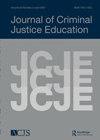Quality Standards for Criminal Justice Education: The Long and Winding Road
IF 0.9
Q3 CRIMINOLOGY & PENOLOGY
引用次数: 0
Abstract
AbstractHigher education in criminology and criminal justice has evolved over the last 100 years in fits and starts. The road was long, and it took many turns, reflecting not only the need for training and professionalism among criminal justice practitioners, but for the development of a new academic field of study at colleges and universities. This article traces the history of the quest for academic standards in higher education, specifically the role of ACJS in this endeavor. Both authors have contributed to ACJS’s efforts over the years and were involved in the two most recent iterations of ACJS Academic Program Review: Certification and Program Endorsement. We chronicle the rise and fall of certification and the recent effort to create an endorsement program that seeks to balance the need for quality control while providing the desired flexibility for individual programs.Keywords: Academy of Criminal Justice Sciences (ACJS)CertificationAccreditationProgram standards Disclosure statementNo potential conflict of interest was reported by the author(s).Additional informationNotes on contributorsJay AlbaneseJay S. Albanese is Professor in the Wilder School of Government and Public Affairs at Virginia Commonwealth University. He received the Ph.D. from the School of Criminal Justice at Rutgers University. Dr. Albanese served as Chief of the International Center at the National Institute of Justice, the research arm of the U.S. Department of Justice. He has served as consultant to the United Nations Office on Drugs and Crime and is a past president and fellow of the Academy of Criminal Justice Sciences. He is author and editor of 22 books on the issues of organized crime, corruption, ethics, transnational crime, and criminal justice. Dr. Albanese is recipient of the Distinguished Teaching Award from Virginia Commonwealth University, the Freda Adler Distinguished Scholar Award from the American Society of Criminology Division of International Criminology, and the Outstanding Faculty Award, Virginia’s highest honor for a faculty member at public or private colleges and universities. Jay Albanese is also a principal in the NGO Criminologist Without Borders. www.jayalbanese.com.Christine TartaroChristine Tartaro is a Distinguished Professor of Criminal Justice at Stockton University. She is a past president of the Northeastern Academy of Criminal Justice Sciences (NEACJS) and past chair of the NEACJS ad hoc Committee on Academic Certification and Accreditation. At the time of this writing, she is the Deputy Chair of the ACJS Academic Review Committee. Her research interests include corrections, mental health, and suicide.刑事司法教育质量标准:一条漫长而曲折的道路
在过去的100年里,犯罪学和刑事司法的高等教育经历了断断续续的发展。这条路很长,有很多弯路,这不仅反映了刑事司法从业人员需要培训和专业精神,而且也反映了在学院和大学发展一个新的学术研究领域的需要。本文追溯了追求高等教育学术标准的历史,特别是ACJS在这一努力中的作用。两位作者多年来都为ACJS的工作做出了贡献,并参与了最近两次ACJS学术项目审查:认证和项目认可。我们记录了认证的兴衰,以及最近创建一个认证项目的努力,该项目旨在平衡质量控制的需要,同时为个别项目提供所需的灵活性。关键词:美国刑事司法科学院(ACJS)认证认可项目标准披露声明作者未报告潜在的利益冲突。本文作者jay S. Albanese是弗吉尼亚联邦大学怀尔德政府与公共事务学院的教授。他在罗格斯大学刑事司法学院获得博士学位。艾博年博士曾担任美国司法部下属研究机构国家司法研究所国际中心主任。他曾担任联合国毒品和犯罪问题办公室的顾问,是刑事司法科学院的前任院长和研究员。他是22本关于有组织犯罪、腐败、道德、跨国犯罪和刑事司法问题书籍的作者和编辑。他曾获得Virginia Commonwealth University的杰出教学奖、美国犯罪学学会国际犯罪学分部的Freda Adler杰出学者奖,以及Virginia公立或私立学院和大学教师的最高荣誉——杰出教师奖。杰伊·阿尔巴尼斯也是非政府组织“无国界犯罪学家”的负责人。www.jayalbanese.com.Christine tartararo christine Tartaro是斯托克顿大学刑事司法的杰出教授。她是东北刑事司法科学院(NEACJS)的前任院长,也是东北刑事司法科学院学术认证和认可特设委员会的前任主席。在撰写本文时,她是ACJS学术审查委员会副主席。她的研究兴趣包括矫正、心理健康和自杀。
本文章由计算机程序翻译,如有差异,请以英文原文为准。
求助全文
约1分钟内获得全文
求助全文
来源期刊

JOURNAL OF CRIMINAL JUSTICE EDUCATION
CRIMINOLOGY & PENOLOGY-
CiteScore
1.90
自引率
36.40%
发文量
52
期刊介绍:
The Journal of Criminal Justice Education (JCJE) is an official publication of the Academy of Criminal Justice Sciences (ACJS). JCJE provides a forum for the examination, discussion and debate of a broad range of issues concerning post-secondary education in criminal justice, criminology and related areas. The aim of JCJE is to enhance the quality of higher education in criminal justice and criminology. JCJE is an education-oriented journal for those undertaking educational and academic endeavors in the fields of criminal justice and criminology. Quality articles that address specific educational or academic issues in these areas are encouraged and will be considered for publication.
 求助内容:
求助内容: 应助结果提醒方式:
应助结果提醒方式:


